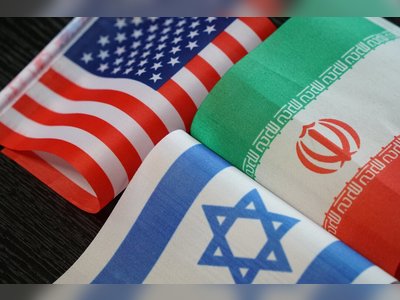
Social media platforms are going to war for online talent
When Katerina Horwitz started out as a social media influencer in 2016, she didn't earn much money beyond a handful of sponsored posts.
A few years later, Horwitz and her husband Yinon quit their day jobs, started a joint Instagram account and got creative with monetizing their 400,000 followers, including selling their own photo filters and building an app that offers editing templates for Instagram Stories.
But recently they've found a simpler revenue stream: earning money directly from social media companies. The couple received a nearly $30,000 payout from Snapchat from just one video they posted to the platform's short-form video hub, Spotlight. They've also earned smaller sums from TikTok for being part of its creator fund, which pays social media influencers based on their number of video views.
"We love creating, but of course we're going to go to the platform that pays us the most," Horwitz told CNN Business.
Creators are the lifeblood of any social media platform, driving trends and engagement and building a loyal community. But increasingly, social media companies seem to be waking up to the reality Horwitz described: Creators may join a platform to build an audience, but ultimately the platform has to pay up for them to stick around. In recent months, major tech companies have stepped up to try to do just that, rolling out more and more ways for creators to make money on their platforms, both from ad revenue on their content and direct handouts.
Snapchat is paying out a total of $1 million a day to those users who make the most entertaining videos for its TikTok rival Spotlight. TikTok launched a $200 million creator fund last year, which promises to reach hundreds of thousands of creators with plans for it to grow to $1 billion over the next three years.
Twitter recently announced it's exploring the possibility of users becoming paid subscribers to their favorite Twitter accounts. And on Sunday, the audio-focused app Clubhouse announced an accelerator program aimed at helping aspiring creators build and monetize an audience.
These announcements reflect both the value of top content creators to the platforms and the fact that there have never been more avenues for internet personalities to make money directly.
"Social media is a war right now," said Ben Ricciardi, founder of influencer marketing agency Times10. "Twitter is trying to figure out ways to bring back larger and larger audiences. Snap is really incentivizing creators to try to come back to the platform or spend more time on the platform."
Even the biggest social networks -- Facebook and Facebook-owned Instagram, with more than a billion monthly active users each -- now find themselves competing for users and talent with newer services like TikTok, he said.
Last week, Facebook announced social media stars can now earn revenue from all types of videos, including those as short as one minute long, and that it's testing new monetizeable sticker ads in Stories. In recent years, the company has rolled out other moneymaking abilities for creators, including earning revenue from ads running on their videos, fan subscriptions that offer a monthly reoccurring payment and the ability for followers to send virtual "Stars" to their favorite creators to show support.
From 2019 to 2020, the number of content creators earning the equivalent of $10,000 per month grew 88% and creators earning $1,000 per month grew 94% on Facebook, according to the company. Facebook declined to provide precise figures on how many creators are earning those monthly amounts.
After resisting paying influencers directly for a long time, Instagram announced similar moves to Facebook last year, offering monetizeable ads in its long-form IGTV video feature and digital badges that fans can buy through Instagram Live.
Yoav Arnstein, director of product management at Facebook, told CNN Business that creators are "absolutely critical" to social media platforms. "A lot of the innovation around creativity and creation of content will come from creators," he said.
Collectively, these moves from the big social platforms mark a major shift in how they approach creators. With the exception of YouTube, which has long allowed influencers to earn money from ads, among other revenue streams, creators have had to hustle on their own to make money through independent brand deals, merchandise, podcasts and other outside-the-box methods.
"So many platforms didn't want to open up monetization to creators because they don't want to admit that the creators are the business drivers," said Karyn Spencer, CMO of influencer marketing platform Whalar. "Now in 2021, we're finally at the point where every platform knows, in order to survive, the talent has to be paid."
For influencers, it feels like a shift, too. Horwitz said for years other people have reached out to her and her husband asking how to make money as influencers.
"It was just not very clear, you had to be your own businessman, and create a website or a product or something and be so creative," she said. "But now all the platforms are making it just very clear: make good content, get views and you get paid."
But recently they've found a simpler revenue stream: earning money directly from social media companies. The couple received a nearly $30,000 payout from Snapchat from just one video they posted to the platform's short-form video hub, Spotlight. They've also earned smaller sums from TikTok for being part of its creator fund, which pays social media influencers based on their number of video views.
"We love creating, but of course we're going to go to the platform that pays us the most," Horwitz told CNN Business.
Creators are the lifeblood of any social media platform, driving trends and engagement and building a loyal community. But increasingly, social media companies seem to be waking up to the reality Horwitz described: Creators may join a platform to build an audience, but ultimately the platform has to pay up for them to stick around. In recent months, major tech companies have stepped up to try to do just that, rolling out more and more ways for creators to make money on their platforms, both from ad revenue on their content and direct handouts.
Snapchat is paying out a total of $1 million a day to those users who make the most entertaining videos for its TikTok rival Spotlight. TikTok launched a $200 million creator fund last year, which promises to reach hundreds of thousands of creators with plans for it to grow to $1 billion over the next three years.
Twitter recently announced it's exploring the possibility of users becoming paid subscribers to their favorite Twitter accounts. And on Sunday, the audio-focused app Clubhouse announced an accelerator program aimed at helping aspiring creators build and monetize an audience.
These announcements reflect both the value of top content creators to the platforms and the fact that there have never been more avenues for internet personalities to make money directly.
"Social media is a war right now," said Ben Ricciardi, founder of influencer marketing agency Times10. "Twitter is trying to figure out ways to bring back larger and larger audiences. Snap is really incentivizing creators to try to come back to the platform or spend more time on the platform."
Even the biggest social networks -- Facebook and Facebook-owned Instagram, with more than a billion monthly active users each -- now find themselves competing for users and talent with newer services like TikTok, he said.
Last week, Facebook announced social media stars can now earn revenue from all types of videos, including those as short as one minute long, and that it's testing new monetizeable sticker ads in Stories. In recent years, the company has rolled out other moneymaking abilities for creators, including earning revenue from ads running on their videos, fan subscriptions that offer a monthly reoccurring payment and the ability for followers to send virtual "Stars" to their favorite creators to show support.
From 2019 to 2020, the number of content creators earning the equivalent of $10,000 per month grew 88% and creators earning $1,000 per month grew 94% on Facebook, according to the company. Facebook declined to provide precise figures on how many creators are earning those monthly amounts.
After resisting paying influencers directly for a long time, Instagram announced similar moves to Facebook last year, offering monetizeable ads in its long-form IGTV video feature and digital badges that fans can buy through Instagram Live.
Yoav Arnstein, director of product management at Facebook, told CNN Business that creators are "absolutely critical" to social media platforms. "A lot of the innovation around creativity and creation of content will come from creators," he said.
Collectively, these moves from the big social platforms mark a major shift in how they approach creators. With the exception of YouTube, which has long allowed influencers to earn money from ads, among other revenue streams, creators have had to hustle on their own to make money through independent brand deals, merchandise, podcasts and other outside-the-box methods.
"So many platforms didn't want to open up monetization to creators because they don't want to admit that the creators are the business drivers," said Karyn Spencer, CMO of influencer marketing platform Whalar. "Now in 2021, we're finally at the point where every platform knows, in order to survive, the talent has to be paid."
For influencers, it feels like a shift, too. Horwitz said for years other people have reached out to her and her husband asking how to make money as influencers.
"It was just not very clear, you had to be your own businessman, and create a website or a product or something and be so creative," she said. "But now all the platforms are making it just very clear: make good content, get views and you get paid."











